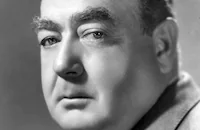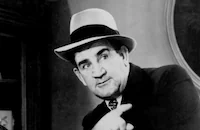It Pays to Advertise
Cast & Crew
Frank Tuttle
Norman Foster
Carole Lombard
Skeets Gallagher
Eugene Pallette
Lucien Littlefield
Film Details
Technical Specs

Synopsis
Rodney Martin, scion of soap king Cyrus Martin, pulls a publicity stunt for his friend, Ambrose Peale, by pretending to elope with a chorus girl and infuriates his father. After Rodney informs Cyrus that he wants to marry Cyrus's secretary, Mary Grayson, Cyrus kicks him out of the house and threatens to disinherit him. Rebellious Rodney packs up and vows to get a job to support himself. His action fits right in with his father's plans, however, as Cyrus pays Mary $5,000 for getting Rodney to fall in love with her and go to work. Mary and Cyrus make another agreement in which he is to pay her 25 percent of whatever Rodney makes plus $5000 if she can keep him working for six straight months. Both promise to keep this agreement a secret from Rodney, who recruits both Mary and Ambrose as business partners in his new soap manufacturing company. Having named the soap "13 Soap - Unlucky for Dirt," Ambrose convinces Rodney to advertise the product. Rodney uses all of his savings to pay for the advertising blitz that ensues, but is unable to make the final payment, or pay their rent. When it appears that a French comtesse is going to buy the French rights to their soap, Rodney writes Donald McChesney, head of the United Ad Corp., a $5,000 check, but later finds out the Comtesse is a fraud and was hoping to swindle them out of $5,000. Rodney refuses to ask his father for the needed funds, so Mary secretly covers the bad check with her savings, asking McChesney to hold off billing them for a month. In the meantime, Cyrus offers to buy the soap company from Rodney after hearing that his longtime competitor, Andrew Adams, is trying to buy the business. Cyrus breaks the deal, however, when he finds out 13 Soap is broke and intimates to Rodney that Mary has some capital she could invest. Rodney's defeat only inspires him to work harder, and when they receive a huge order for soap, but have no actual soap to sell, he pitches a deal to Cyrus, who refuses to provide the product. Cyrus finds out that Adams is supplying them, however, and promises Rodney he will beat any of Adams's offers to buy the business. Cyrus reveals his agreement with Mary to Rodney, who, aware that she paid off his bill to McChesney with her own money, realizes that now Mary loves him sincerely. Cyrus buys the business and proceeds to lecture Adams on Ambrose Peale's philosophy of advertising.

Director
Frank Tuttle
Cast

Norman Foster

Carole Lombard
Skeets Gallagher

Eugene Pallette

Lucien Littlefield
Helen Johnson

Louise Brooks
Morgan Wallace

Tom Kennedy
Marcia Manners
Junior Coghlan
John Howell
John Sinclair

Film Details
Technical Specs

Quotes
Trivia
Notes
The working title of the film was Have You Got It?. This was Louise Brooks's first film in two years. In the film, Skeets Gallagher's character uses the names of many famous products in order to promote the business of advertising. However, according to Motion Picture Herald, many of these names were unfamiliar to British audiences, so some scenes had to be rewritten in order to accommodate European tastes. Roi Cooper Megrue and Walter Hackett's play was first filmed in 1919 by Paramount as It Pays to Advertise (see AFI Catalog of Feature Films, 1911-20). Paramount remade the film in 1932 in their studio at Joinville, France under the title Criez-le sur les toits!, which was directed by Karl Anton and starred Saint-Granier and Robert Burnier.












